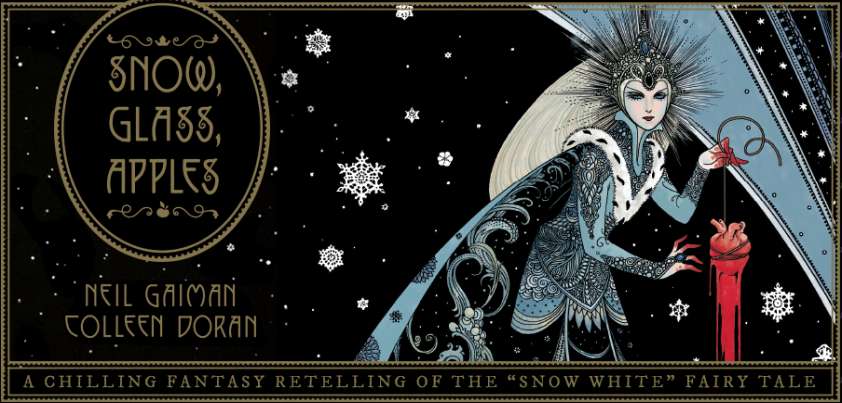 This Neil Gaiman story is yet another re-invention of the Snow White tale. However, a shift in point-of-view from a third-person omniscient narrator to the first-person perspective of the Queen allows the story to be re-imagined in a way we are unlikely to see from Disney. The much-maligned Queen knows a little magic (enough to glimpse the future and enchant the King), but not enough to match her evil stepdaughter. In the end, the Queen’s fate adds a new meaning to the slang term to feel cooked. Themes include power, vampirism, murder, revenge, jealousy, cruelty, sexual depravity (necrophilia, pedophilia, incest). More…
This Neil Gaiman story is yet another re-invention of the Snow White tale. However, a shift in point-of-view from a third-person omniscient narrator to the first-person perspective of the Queen allows the story to be re-imagined in a way we are unlikely to see from Disney. The much-maligned Queen knows a little magic (enough to glimpse the future and enchant the King), but not enough to match her evil stepdaughter. In the end, the Queen’s fate adds a new meaning to the slang term to feel cooked. Themes include power, vampirism, murder, revenge, jealousy, cruelty, sexual depravity (necrophilia, pedophilia, incest). More…
Category Archives: Short Stories
The Revolt of “Mother”
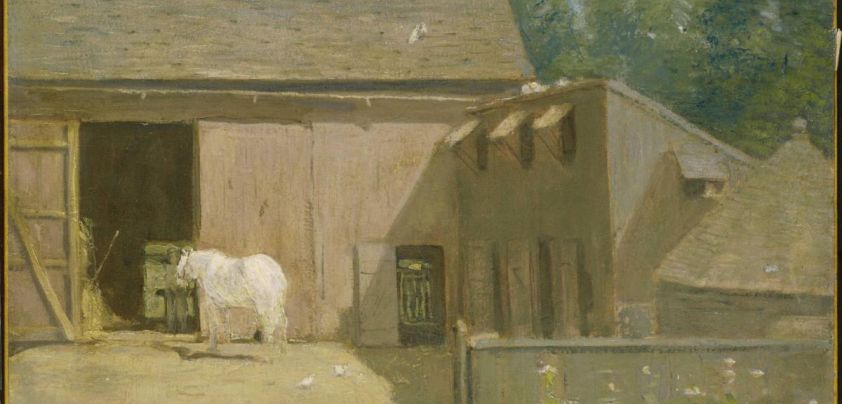 This Mary E. Wilkins Freeman story is an early example of American literary feminism. When Adoniram, an insensitive, authoritarian farmer decides to build a barn on the site of a promised new house and refuses to discuss the issue, his long-suffering wife takes a stand. Sarah, the hard-working and devoted “Mother”, sees his need to spend a few days away as a sign from God. Much to the surprise and amusement of the local community, she goes about turning the new barn into a home. Themes: gender roles/repression (male domination), insincerity (false promises), spirituality, rebellion. More…
This Mary E. Wilkins Freeman story is an early example of American literary feminism. When Adoniram, an insensitive, authoritarian farmer decides to build a barn on the site of a promised new house and refuses to discuss the issue, his long-suffering wife takes a stand. Sarah, the hard-working and devoted “Mother”, sees his need to spend a few days away as a sign from God. Much to the surprise and amusement of the local community, she goes about turning the new barn into a home. Themes: gender roles/repression (male domination), insincerity (false promises), spirituality, rebellion. More…
The New Constitution / Naya Qanun
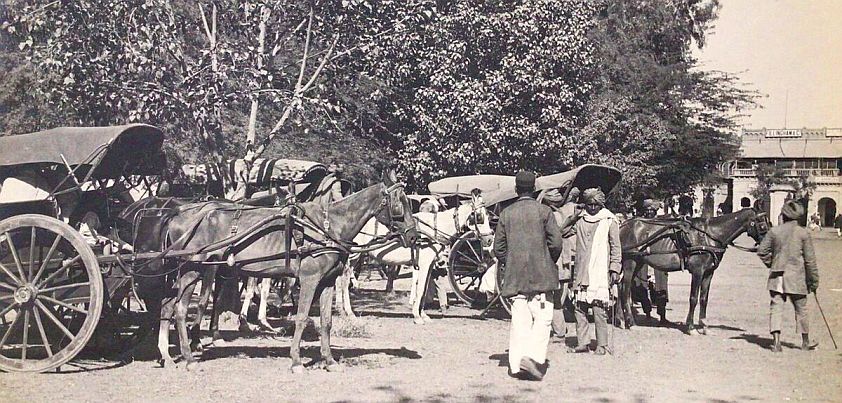 A message of this story by Saadat Hasan Manto is to make sure you fully understand something you overhear before acting on it. An illiterate tongawala [coachman] learns about the world by eavesdropping on customers. Over several days, he overhears talk of a new “India Act”, which he misinterprets to be a new constitution that will free India from British rule. Having developed a hatred of the British for subjugating and exploiting his country, he is excited by the “news”. Unfortunately, acting on it lands him in jail. Themes include colonialism vs. freedom and self-determination, excitement, hope, disillusionment. More…
A message of this story by Saadat Hasan Manto is to make sure you fully understand something you overhear before acting on it. An illiterate tongawala [coachman] learns about the world by eavesdropping on customers. Over several days, he overhears talk of a new “India Act”, which he misinterprets to be a new constitution that will free India from British rule. Having developed a hatred of the British for subjugating and exploiting his country, he is excited by the “news”. Unfortunately, acting on it lands him in jail. Themes include colonialism vs. freedom and self-determination, excitement, hope, disillusionment. More…
Who Will Greet You At Home
 In this surreal horror story from Lesley Nneka Arimah, children are created in the form of craft dolls by their mother, blessed by their grandmother or an elderly substitute, and nurtured for a year until they “become flesh”. In the interim they feed, move and act like babies, but in their doll form. The dolls can be made from any material (straw, sticks, clay, etc.) that is strong enough to last a year. But there are rules. When Ogechi, the impoverished protagonist desperate to have a child breaks one, bad things happen. Themes: magic, poverty, exploitation, isolation, obsession, motherhood. More…
In this surreal horror story from Lesley Nneka Arimah, children are created in the form of craft dolls by their mother, blessed by their grandmother or an elderly substitute, and nurtured for a year until they “become flesh”. In the interim they feed, move and act like babies, but in their doll form. The dolls can be made from any material (straw, sticks, clay, etc.) that is strong enough to last a year. But there are rules. When Ogechi, the impoverished protagonist desperate to have a child breaks one, bad things happen. Themes: magic, poverty, exploitation, isolation, obsession, motherhood. More…
The Half-Skinned Steer
 Annie Proulx’s protagonist begins a four-day road-trip to attend a funeral as a confident, vital octogenarian in full control of his faculties. Foolish mistakes along the way see him finish the journey a desperate, disoriented figure facing a ghostly “half-skinned steer” in a snowstorm. As he drives, he recalls his disillusioned youth on the family ranch. The memories focus on his sexual awakening and the family’s interactions with his alcoholic father’s flirtatious, story-telling, “horsey” girlfriend. The story’s major theme is ageing and its effects on memories and one’s ability to think clearly. Other themes: homecoming, sexuality, man vs. nature, death. More…
Annie Proulx’s protagonist begins a four-day road-trip to attend a funeral as a confident, vital octogenarian in full control of his faculties. Foolish mistakes along the way see him finish the journey a desperate, disoriented figure facing a ghostly “half-skinned steer” in a snowstorm. As he drives, he recalls his disillusioned youth on the family ranch. The memories focus on his sexual awakening and the family’s interactions with his alcoholic father’s flirtatious, story-telling, “horsey” girlfriend. The story’s major theme is ageing and its effects on memories and one’s ability to think clearly. Other themes: homecoming, sexuality, man vs. nature, death. More…
The Lagoon
 The major message of this acclaimed story from Joseph Conrad is that you can’t escape reality: there is no place where death is forgotten — where death is unknown. Arsat, a powerful warrior, risks all for the love of a royal slave girl. While making their escape, he abandons his devoted brother as he is being attacked by pursuers. Some time later, the woman dies of fever in their lagoon-side jungle hideaway. Experiencing remorse over both deaths, he decides that the only path to redemption is (some would say unjustified) retribution. Themes: brotherly love, romantic obsession, courage, betrayal, guilt, isolation, death. More…
The major message of this acclaimed story from Joseph Conrad is that you can’t escape reality: there is no place where death is forgotten — where death is unknown. Arsat, a powerful warrior, risks all for the love of a royal slave girl. While making their escape, he abandons his devoted brother as he is being attacked by pursuers. Some time later, the woman dies of fever in their lagoon-side jungle hideaway. Experiencing remorse over both deaths, he decides that the only path to redemption is (some would say unjustified) retribution. Themes: brotherly love, romantic obsession, courage, betrayal, guilt, isolation, death. More…
Yellow Woman
 “Yellow Woman” is a central, usually heroic figure in the folklore of Pueblo Native Americans. Like Leslie Marmon Silko’s protagonist, she is often portrayed as an independent, sexually uninhibited character who connects with the spirit world. This story blurs the lines between that myth and reality. The “real world” presented is full of conflicts: old ways vs. new; pristine landscapes vs. ranches and highways; law and order vs. cattle theft and murder; faithfulness vs. desire. In the end, it is this reality that wins the day. Themes: storytelling, myth vs reality, identity, interconnectedness with nature, empowerment through sexuality. More…
“Yellow Woman” is a central, usually heroic figure in the folklore of Pueblo Native Americans. Like Leslie Marmon Silko’s protagonist, she is often portrayed as an independent, sexually uninhibited character who connects with the spirit world. This story blurs the lines between that myth and reality. The “real world” presented is full of conflicts: old ways vs. new; pristine landscapes vs. ranches and highways; law and order vs. cattle theft and murder; faithfulness vs. desire. In the end, it is this reality that wins the day. Themes: storytelling, myth vs reality, identity, interconnectedness with nature, empowerment through sexuality. More…
Idyll
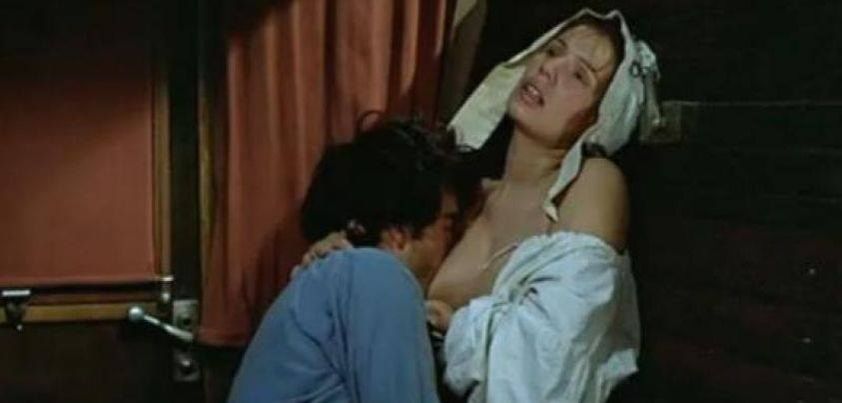 In this story by Guy de Maupassant, a man and woman share a compartment and become friends during a long train journey. The idyllic countryside is in contrast to the way the woman feels. She is a wet-nurse (a woman who cares for and breast-feeds other people’s babies) and is in great pain because she hasn’t had a baby to her breasts in over two days. The man offers to help and, in so doing, solves a problem of his own. Themes include connection, desire, social perceptions of human anatomy and function, defiance of social norms to satisfy a basic need. More…
In this story by Guy de Maupassant, a man and woman share a compartment and become friends during a long train journey. The idyllic countryside is in contrast to the way the woman feels. She is a wet-nurse (a woman who cares for and breast-feeds other people’s babies) and is in great pain because she hasn’t had a baby to her breasts in over two days. The man offers to help and, in so doing, solves a problem of his own. Themes include connection, desire, social perceptions of human anatomy and function, defiance of social norms to satisfy a basic need. More…
Mary Postgate
 Set in World War 1, Rudyard Kipling‘s Mary Postgate, can be interpreted in a number of ways, each of which suggests a different reason for the unusual reaction of the protagonist (a prim, proper, middle-aged spinster) to watching the slow, painful death of a seriously injured pilot. Her almost orgasmic physical response and subsequent behavior – a luxurious hot bath before tea – indicate that she found it an uplifting experience. This suggests that her bitterness was directed at not only the enemy, but also other aspect(s) of her life. Themes: the brutality of war, repression, loss, anger, revenge, release. More…
Set in World War 1, Rudyard Kipling‘s Mary Postgate, can be interpreted in a number of ways, each of which suggests a different reason for the unusual reaction of the protagonist (a prim, proper, middle-aged spinster) to watching the slow, painful death of a seriously injured pilot. Her almost orgasmic physical response and subsequent behavior – a luxurious hot bath before tea – indicate that she found it an uplifting experience. This suggests that her bitterness was directed at not only the enemy, but also other aspect(s) of her life. Themes: the brutality of war, repression, loss, anger, revenge, release. More…
The Home-Coming
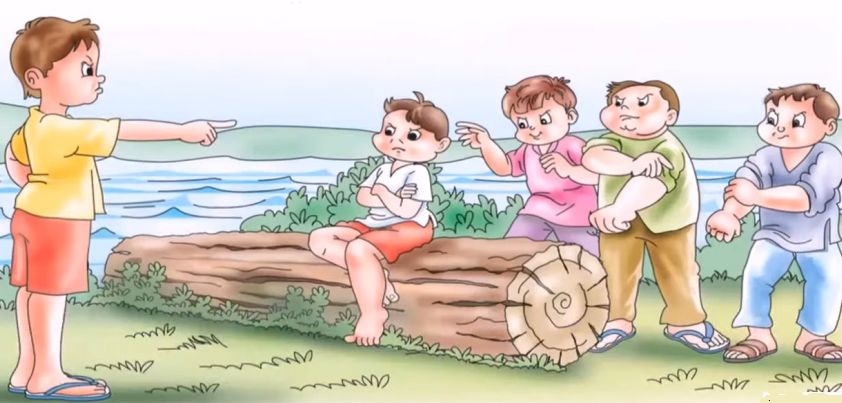 In this heartbreaking story by Rabindranath Tagore, a rebellious country teen who is always in trouble at home jumps at an offer to live with his uncle’s family in Calcutta. However, he finds city life unbearable. Made to feel unwelcome by his aunt, academically backward, and teased at school for his country ways, he yearns for the open spaces and life he had before. The boy runs away, but his journey home ends tragically. Themes include adolescent rebellion and naivety, city vs. country life, homesickness, abandonment and isolation (the need for love and a sense of belonging), reconciliation and death. More…
In this heartbreaking story by Rabindranath Tagore, a rebellious country teen who is always in trouble at home jumps at an offer to live with his uncle’s family in Calcutta. However, he finds city life unbearable. Made to feel unwelcome by his aunt, academically backward, and teased at school for his country ways, he yearns for the open spaces and life he had before. The boy runs away, but his journey home ends tragically. Themes include adolescent rebellion and naivety, city vs. country life, homesickness, abandonment and isolation (the need for love and a sense of belonging), reconciliation and death. More…
The Day the Dancers Came
 This story by Bienvenido Santos is about an aging Filipino expatriate who feels cut off from his culture. After years of menial work in the United States, the protagonist has no remaining family and only one local, possibly terminally ill, Filipino friend. Rather naïvely, he decides to approach and offer to host to a group of visiting tinikling dancers. He is ignored, but makes an audio recording of their performance to remember them by. In the depressing denouement, he faces the grim reality of losing them all. Themes include nostalgia, connection with one’s roots, aging and death. More…
This story by Bienvenido Santos is about an aging Filipino expatriate who feels cut off from his culture. After years of menial work in the United States, the protagonist has no remaining family and only one local, possibly terminally ill, Filipino friend. Rather naïvely, he decides to approach and offer to host to a group of visiting tinikling dancers. He is ignored, but makes an audio recording of their performance to remember them by. In the depressing denouement, he faces the grim reality of losing them all. Themes include nostalgia, connection with one’s roots, aging and death. More…
A Good Man is Hard to Find
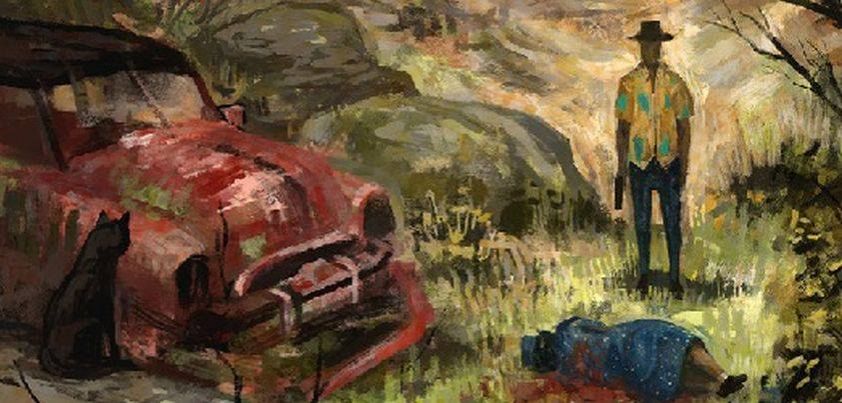 Flannery O’Connor is a master at coming up with stories in which almost every main character has some kind of flaw. It is hard to like any of this dysfunctional family of six (except maybe the baby) as they cruise down Highway 441. When their car overturns beside a deserted road, they attract the attention of a crazed killer who calls himself “The Misfit”. As the rest of the family are murdered around her, the grandmother tries to convince the Misfit that deep inside he is one of those hard to find men. Themes: prejudice, deception, violence, religion, “goodness”, redemption More…
Flannery O’Connor is a master at coming up with stories in which almost every main character has some kind of flaw. It is hard to like any of this dysfunctional family of six (except maybe the baby) as they cruise down Highway 441. When their car overturns beside a deserted road, they attract the attention of a crazed killer who calls himself “The Misfit”. As the rest of the family are murdered around her, the grandmother tries to convince the Misfit that deep inside he is one of those hard to find men. Themes: prejudice, deception, violence, religion, “goodness”, redemption More…
Neighbours
 Set in 1970s Burma, this story by Moe Moe (aka Inya) uses the experiences of a young couple with a four-month-old child to explore the theme of “neighborliness”. Moving to the suburbs after living with family “downtown”, they find the neighbors friendly and helpful but also experience incidences of prying, malicious gossip, quarreling, greed, and pressure to keep up appearances. Moving to an apartment closer to the city, they find an individualistic environment where nobody even talks to their neighbors. This leaves the poor protagonist with no idea what sort of neighborhood she wants to live in. More…
Set in 1970s Burma, this story by Moe Moe (aka Inya) uses the experiences of a young couple with a four-month-old child to explore the theme of “neighborliness”. Moving to the suburbs after living with family “downtown”, they find the neighbors friendly and helpful but also experience incidences of prying, malicious gossip, quarreling, greed, and pressure to keep up appearances. Moving to an apartment closer to the city, they find an individualistic environment where nobody even talks to their neighbors. This leaves the poor protagonist with no idea what sort of neighborhood she wants to live in. More…
The Boy Who Broke the Bank
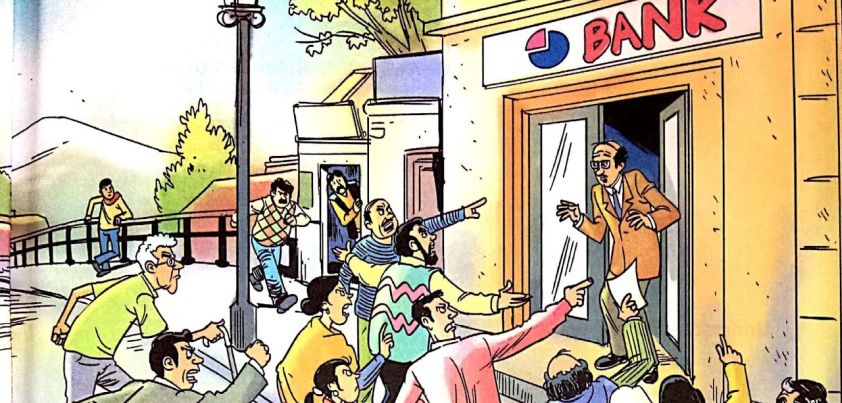 Although published over thirty years ago, this light-hearted story by Ruskin Bond highlights a major problem in today’s world: the spread of fake news on social networks based on incomplete or inaccurate information. A young sweeper working for an Indian bank is paid late, presumably because of his lowly caste. He complains to a friend, who mentions it to a customer, and soon word spreads throughout the bazaar that the bank cannot pay any of its salaries. This causes panic among depositors, leading to a run on the unfortunate bank. Themes include social class, exploitation, discontent, rumor, panic, crowd psychology. More…
Although published over thirty years ago, this light-hearted story by Ruskin Bond highlights a major problem in today’s world: the spread of fake news on social networks based on incomplete or inaccurate information. A young sweeper working for an Indian bank is paid late, presumably because of his lowly caste. He complains to a friend, who mentions it to a customer, and soon word spreads throughout the bazaar that the bank cannot pay any of its salaries. This causes panic among depositors, leading to a run on the unfortunate bank. Themes include social class, exploitation, discontent, rumor, panic, crowd psychology. More…
The End of the Party
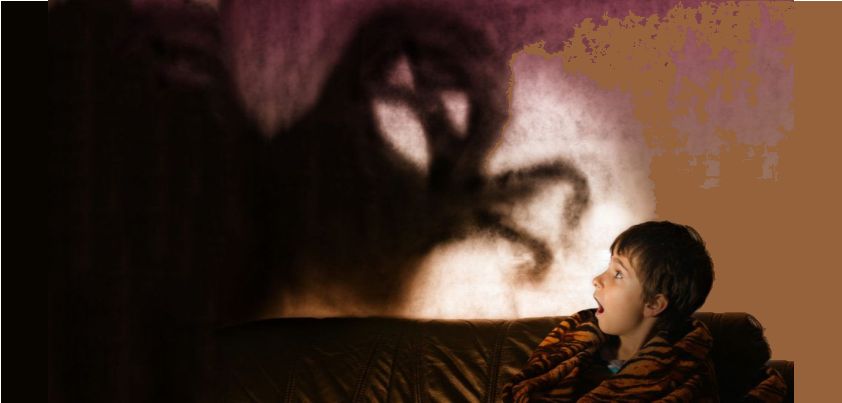 Although the 9-year-old twins in this Graham Greene story look the same, they have very different psychological dispositions. The first-born (Peter) is self-confident and has a special connection with his brother. The younger (Francis) has an anxiety disorder that results in unreasoning fear, particularly of the dark. Peter feels what Francis feels, and is fiercely protective of him. Despite their best efforts to avoid it, the two attend a birthday party that will include a game of hide-and-seek in the dark. During the game, a thoughtless act by Peter has tragic results. Themes: innocence, brotherhood, connection, fear, adult insensitivity, death. More…
Although the 9-year-old twins in this Graham Greene story look the same, they have very different psychological dispositions. The first-born (Peter) is self-confident and has a special connection with his brother. The younger (Francis) has an anxiety disorder that results in unreasoning fear, particularly of the dark. Peter feels what Francis feels, and is fiercely protective of him. Despite their best efforts to avoid it, the two attend a birthday party that will include a game of hide-and-seek in the dark. During the game, a thoughtless act by Peter has tragic results. Themes: innocence, brotherhood, connection, fear, adult insensitivity, death. More…
Town and Country Lovers
 Although the South African law banning sexual intercourse between “whites” and “non-whites” was repealed in 1985 (five years after Nadine Gordimer wrote this story), inter-racial and inter-religious relationships are still frowned upon in some cultures. Moreover, as in the story, the consequences for women are often much more severe than for men. Despite the obvious affection between the two couples in the story, questions arise as to whether for the men the sex was a function of convenience rather than love, and the extent to which the women initially felt pressured into participating. Themes: forbidden love, sexual coercion, unequal consequences. More…
Although the South African law banning sexual intercourse between “whites” and “non-whites” was repealed in 1985 (five years after Nadine Gordimer wrote this story), inter-racial and inter-religious relationships are still frowned upon in some cultures. Moreover, as in the story, the consequences for women are often much more severe than for men. Despite the obvious affection between the two couples in the story, questions arise as to whether for the men the sex was a function of convenience rather than love, and the extent to which the women initially felt pressured into participating. Themes: forbidden love, sexual coercion, unequal consequences. More…
The Blues I’m Playing
 This story from Langston Hughes contrasts two women with very different outlooks on life. A wealthy, white, middle-aged widow finds purpose and intimacy through the patronization of young artists. Tensions emerge when the woman, who expects her protégés to behave in a manner consistent with her high social standing, takes on a black pianist for the first time. The talented, independent, working class young woman has her own ideas on life, love, and the music she wants to play. Themes: art, paternalism vs. independence, race and racism, sexuality, the significance and transforming power of music. More…
This story from Langston Hughes contrasts two women with very different outlooks on life. A wealthy, white, middle-aged widow finds purpose and intimacy through the patronization of young artists. Tensions emerge when the woman, who expects her protégés to behave in a manner consistent with her high social standing, takes on a black pianist for the first time. The talented, independent, working class young woman has her own ideas on life, love, and the music she wants to play. Themes: art, paternalism vs. independence, race and racism, sexuality, the significance and transforming power of music. More…
Johnny Mnemonic
 The protagonist in this pioneering cyberpunk story by William Gibson is a data courier. To escape a Yakuza assassin, he must decode a message in a secure storage device implanted in his brain. When the client who holds the password is killed, he turns to razor-fingered Molly Millions, Jones the dolphin, and the “Lo Teks”, Molly’s anti-technology friends, for help. The major theme, given that every major character has some kind of bionic enhancement, is identity (how technology can blur the line between man and machine). Other themes: body augmentation, corporate power, organized crime. More…
The protagonist in this pioneering cyberpunk story by William Gibson is a data courier. To escape a Yakuza assassin, he must decode a message in a secure storage device implanted in his brain. When the client who holds the password is killed, he turns to razor-fingered Molly Millions, Jones the dolphin, and the “Lo Teks”, Molly’s anti-technology friends, for help. The major theme, given that every major character has some kind of bionic enhancement, is identity (how technology can blur the line between man and machine). Other themes: body augmentation, corporate power, organized crime. More…
The Rockpile
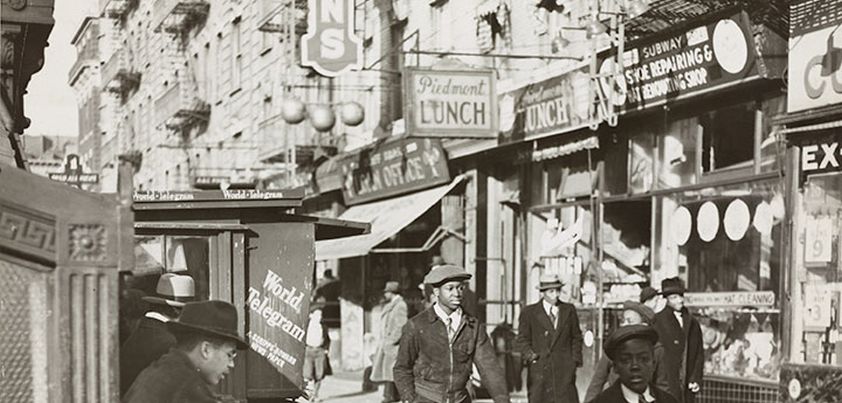 This partly autobiographical story from James Baldwin explores aspects of African-American life in Depression-era Harlem. It contrasts religious zeal with violence and division in the community. In addition to the violence taking place in the children’s “gang” skirmishes on the rockpile, a climate of fear and intimidation exists in the protagonist’s household. Religion is presented not as an uplifting faith that gives meaning to life, but rather something to be feared and obeyed, and through which people are automatically classified as either “redeemed” or “wicked”. Themes: religion, fear, obedience/temptation, choices and consequences, alienation, motherly love. More…
This partly autobiographical story from James Baldwin explores aspects of African-American life in Depression-era Harlem. It contrasts religious zeal with violence and division in the community. In addition to the violence taking place in the children’s “gang” skirmishes on the rockpile, a climate of fear and intimidation exists in the protagonist’s household. Religion is presented not as an uplifting faith that gives meaning to life, but rather something to be feared and obeyed, and through which people are automatically classified as either “redeemed” or “wicked”. Themes: religion, fear, obedience/temptation, choices and consequences, alienation, motherly love. More…
The Weeping Fig
 This story by Judith Wright is a tribute to the pioneering families who tamed the harsh Australian outback. A man comes into possession of his great-grandfather’s diary. In search of his roots, he visits the cattle station on which his ancestors had settled. He finds what he came for in a weeping fig tree planted by his great-grandmother… a mass of green and the tallest tree for miles. The tree stands as a testament to his forefathers’ courage and determination, and in reconciliation for their failure. Themes include man vs. nature, the pioneering spirit, hope, suffering and defeat, reconciliation, identity/connection. More…
This story by Judith Wright is a tribute to the pioneering families who tamed the harsh Australian outback. A man comes into possession of his great-grandfather’s diary. In search of his roots, he visits the cattle station on which his ancestors had settled. He finds what he came for in a weeping fig tree planted by his great-grandmother… a mass of green and the tallest tree for miles. The tree stands as a testament to his forefathers’ courage and determination, and in reconciliation for their failure. Themes include man vs. nature, the pioneering spirit, hope, suffering and defeat, reconciliation, identity/connection. More…
The Night the Bed Fell / Ghost Got In
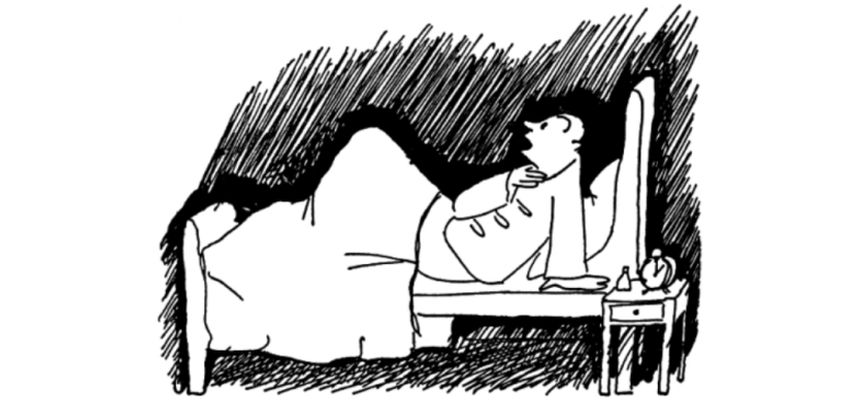 These two light-hearted comedies from James Thurber involve the same house, the same family (notionally Thurber’s), the same attic bed, and the same message common in slapstick humor: Things aren’t always as they initially seem. In the first story, confusion over the location of a collapsing bed results in chaos in the house. In the second, ghostly sounds in the night extend the pandemonium to involve a neighbor and the police. Both stories include themes of memories, eccentricity, paranoia, misunderstanding and mayhem. The Night the Ghost Got In includes additional themes of the supernatural and responding to the unknown. More…
These two light-hearted comedies from James Thurber involve the same house, the same family (notionally Thurber’s), the same attic bed, and the same message common in slapstick humor: Things aren’t always as they initially seem. In the first story, confusion over the location of a collapsing bed results in chaos in the house. In the second, ghostly sounds in the night extend the pandemonium to involve a neighbor and the police. Both stories include themes of memories, eccentricity, paranoia, misunderstanding and mayhem. The Night the Ghost Got In includes additional themes of the supernatural and responding to the unknown. More…
A Christmas Memory
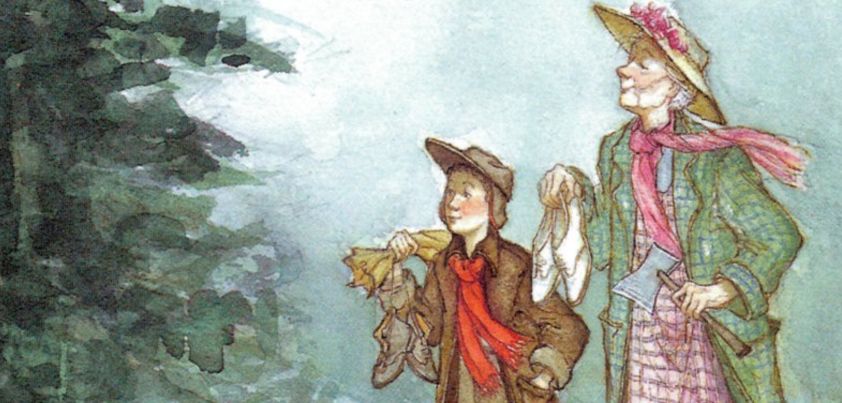 This sentimental Christmas story from Truman Capote takes readers back to a time when children created their own fun and could safely explore the outdoors alone. The protagonist, a seven-year-old-boy, and his aged but child-like female cousin are best friends; two outsiders who help each other deal with being alone in the world. It is telling that their Christmas fruitcakes are not for neighbors and those who have power/know best (their pious carers), but strangers who either “strike their fancy” or have shown kindness towards them over the years. Themes: nostalgia, Christmas, friendship, innocence, isolation, poverty, coming of age. More…
This sentimental Christmas story from Truman Capote takes readers back to a time when children created their own fun and could safely explore the outdoors alone. The protagonist, a seven-year-old-boy, and his aged but child-like female cousin are best friends; two outsiders who help each other deal with being alone in the world. It is telling that their Christmas fruitcakes are not for neighbors and those who have power/know best (their pious carers), but strangers who either “strike their fancy” or have shown kindness towards them over the years. Themes: nostalgia, Christmas, friendship, innocence, isolation, poverty, coming of age. More…
Lamb to the Slaughter
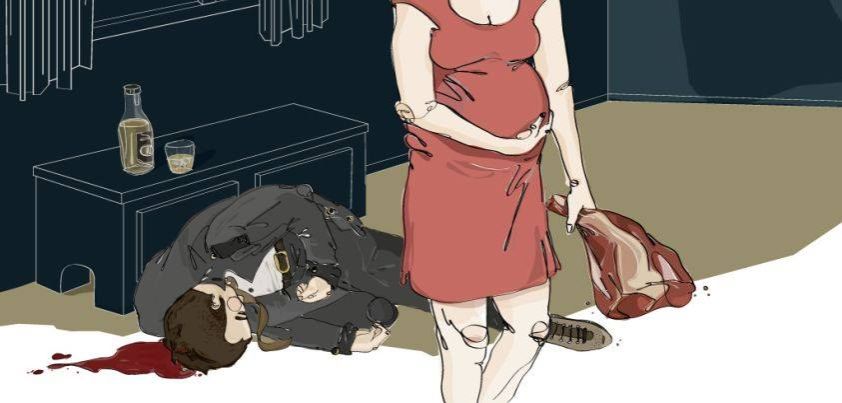 The title of this story by Roald Dahl may have a clever double meaning. On the one hand, we have a woman who uses a lamb, or rather a frozen leg of lamb, to kill her husband. On the other, it may relate to the English idiom “Like a lamb to the Slaughter”. This would lead to the question: Which of the characters (the husband, the wife or both) could be described as someone going calmly about their business, not knowing that something very unpleasant is about to happen to them? Themes include betrayal, identity/gender stereotyping, injustice and revenge. More…
The title of this story by Roald Dahl may have a clever double meaning. On the one hand, we have a woman who uses a lamb, or rather a frozen leg of lamb, to kill her husband. On the other, it may relate to the English idiom “Like a lamb to the Slaughter”. This would lead to the question: Which of the characters (the husband, the wife or both) could be described as someone going calmly about their business, not knowing that something very unpleasant is about to happen to them? Themes include betrayal, identity/gender stereotyping, injustice and revenge. More…
The Californian’s Tale
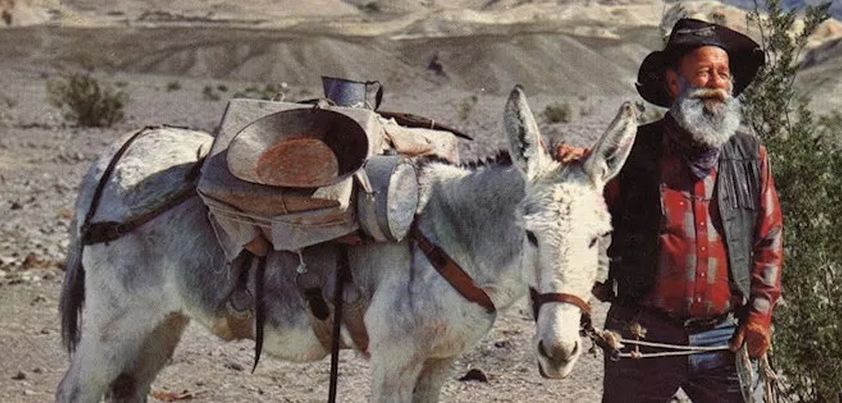 The major themes of this story from Samuel Clemens (aka Mark Twain) are loneliness, love, loss, madness and friendship. A prospector wandering the desolate Californian goldfields after the mines had all closed is surprised to come across a beautifully maintained cabin. When asked inside by the owner, he marvels at the comfort and quality of its furnishings and obvious signs of a woman’s touch. The man tells him that his wife is away visiting family but will return in three days. The prospector accepts the man’s invitation to stay and meet her, but later wishes he hadn’t. More…
The major themes of this story from Samuel Clemens (aka Mark Twain) are loneliness, love, loss, madness and friendship. A prospector wandering the desolate Californian goldfields after the mines had all closed is surprised to come across a beautifully maintained cabin. When asked inside by the owner, he marvels at the comfort and quality of its furnishings and obvious signs of a woman’s touch. The man tells him that his wife is away visiting family but will return in three days. The prospector accepts the man’s invitation to stay and meet her, but later wishes he hadn’t. More…
The Challenge
 Set in 1950s Peru, the major theme of Mario Vargas Llosa’s The Challenge is the Latin American concept of Machismo (being seen as a man among men). When a powerful street thug challenges a man from a rival group to a knife fight, the other accepts. He and his friends put on a brave face, even though they know he has little chance. The thug offers clemency as he begins to dominate the fight but the other refuses, preferring to die rather than admit defeat. Other themes include lawlessness, violence, rivalry, loyalty, honor. More…
Set in 1950s Peru, the major theme of Mario Vargas Llosa’s The Challenge is the Latin American concept of Machismo (being seen as a man among men). When a powerful street thug challenges a man from a rival group to a knife fight, the other accepts. He and his friends put on a brave face, even though they know he has little chance. The thug offers clemency as he begins to dominate the fight but the other refuses, preferring to die rather than admit defeat. Other themes include lawlessness, violence, rivalry, loyalty, honor. More…
Off
 In this story by Aimee Bender a conceited, deliberately overdressed woman attends a party with the stated objective of kissing three men of different hair color. Her character is defined in an anecdote about how she once named her Great Dane “Off” to play with the minds of other women at a dog park. The independently wealthy woman is highly insecure, struggling to fit in and form meaningful relationships. This results in bitterness and vindictiveness towards other women, and a demeaning climax as she tries to win kiss number three. Themes include self-admiration, loneliness, insecurity, jealousy and bitterness, hope. More…
In this story by Aimee Bender a conceited, deliberately overdressed woman attends a party with the stated objective of kissing three men of different hair color. Her character is defined in an anecdote about how she once named her Great Dane “Off” to play with the minds of other women at a dog park. The independently wealthy woman is highly insecure, struggling to fit in and form meaningful relationships. This results in bitterness and vindictiveness towards other women, and a demeaning climax as she tries to win kiss number three. Themes include self-admiration, loneliness, insecurity, jealousy and bitterness, hope. More…
A Horse and Two Goats
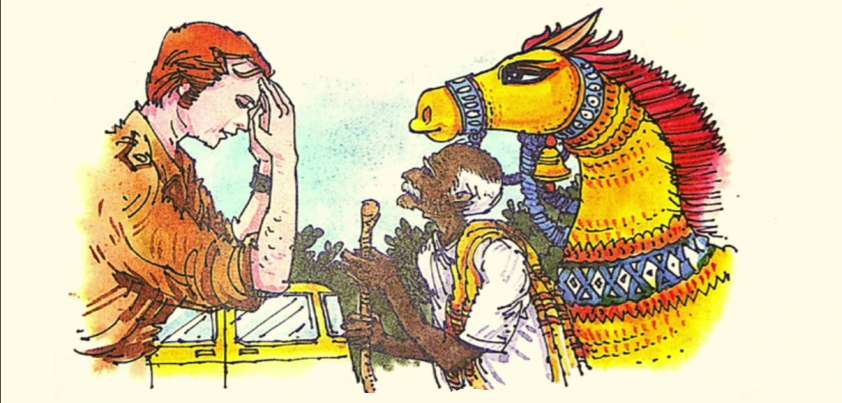 This story from R. K. Narayan is a humorous account of the protagonist (Muri)’s trials and tribulations in a remote Indian village. Its major theme is culture clash (the villagers’ deep spirituality and acceptance of their lot vs. an American’s “money is everything” attitude). Other themes include miscommunication (and how it can sometimes pay off handsomely), change (younger villagers’ loss of appreciation of their cultural heritage, as symbolized by their indifference towards the statue), chauvinism (both men are extremely patronizing towards their wives), and archaeological looting (the American must surely recognize that the statue is of spiritual and/or historical significance!). More…
This story from R. K. Narayan is a humorous account of the protagonist (Muri)’s trials and tribulations in a remote Indian village. Its major theme is culture clash (the villagers’ deep spirituality and acceptance of their lot vs. an American’s “money is everything” attitude). Other themes include miscommunication (and how it can sometimes pay off handsomely), change (younger villagers’ loss of appreciation of their cultural heritage, as symbolized by their indifference towards the statue), chauvinism (both men are extremely patronizing towards their wives), and archaeological looting (the American must surely recognize that the statue is of spiritual and/or historical significance!). More…
The Eskimo Connection
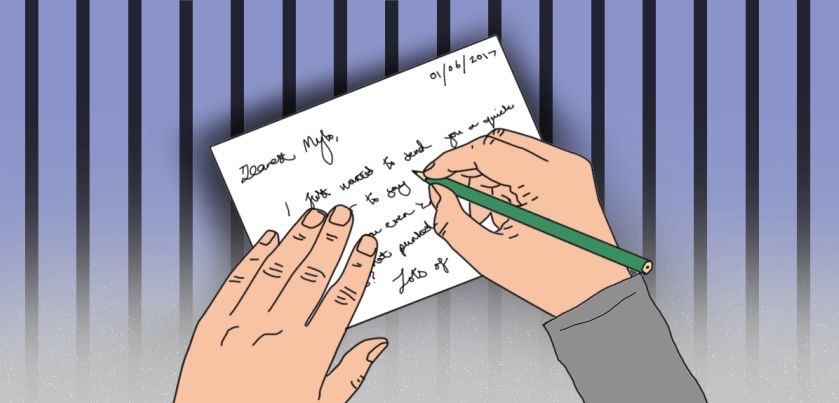 The “connection” in this story by Hisaye Yamamoto is a correspondence relationship between a widowed Japanese-American poet living in California and a young Eskimo man jailed in a federal penitentiary. Although initially reluctant to write due in part to differences in age, family situation, culture and social situation, the woman empathises with the young man because of her own experiences in a wartime internment camp. This clouds her judgement, and she naively overlooks hints that he may have a capacity for extreme violence. Themes include loneliness, compassion, matriarchy, family struggle, interethnic bonding, art and writing, violence, imprisonment, religion. More…
The “connection” in this story by Hisaye Yamamoto is a correspondence relationship between a widowed Japanese-American poet living in California and a young Eskimo man jailed in a federal penitentiary. Although initially reluctant to write due in part to differences in age, family situation, culture and social situation, the woman empathises with the young man because of her own experiences in a wartime internment camp. This clouds her judgement, and she naively overlooks hints that he may have a capacity for extreme violence. Themes include loneliness, compassion, matriarchy, family struggle, interethnic bonding, art and writing, violence, imprisonment, religion. More…
Nothing Ever Breaks Except the Heart
 In this story from Kay Boyle, a harried man working in an airline ticket office befriends a woman trying to reach America from war-torn Europe. The essence of the story lies in his response to a complaint by a fellow employee: I tell you, I can’t do it much longer. I’m at the breaking point. His retort: You’ve been saying that for a year and a half. But nothing ever breaks. We later learn that something has broken for the man (his heart), and it is not over a woman! Themes: unfulfilled dreams, alcohol abuse, self-reproach, despair, flight from war. More…
In this story from Kay Boyle, a harried man working in an airline ticket office befriends a woman trying to reach America from war-torn Europe. The essence of the story lies in his response to a complaint by a fellow employee: I tell you, I can’t do it much longer. I’m at the breaking point. His retort: You’ve been saying that for a year and a half. But nothing ever breaks. We later learn that something has broken for the man (his heart), and it is not over a woman! Themes: unfulfilled dreams, alcohol abuse, self-reproach, despair, flight from war. More…
Recitatif
 This story by Toni Morrison explores the relationship between two women of different race who meet as eight-year-olds in a children’s shelter and become reacquainted at several points in the future. In addition to conflicts that arise as their lives move in different directions, both remain haunted by recollections of the ill-treatment received by a disabled kitchen-hand who worked at the shelter. An unusual aspect of the story is that although a major theme is racism, we never learn the ethnicity of the two women. Other themes: friendship, alienation, prejudice, disability, parenting, memory. More…
This story by Toni Morrison explores the relationship between two women of different race who meet as eight-year-olds in a children’s shelter and become reacquainted at several points in the future. In addition to conflicts that arise as their lives move in different directions, both remain haunted by recollections of the ill-treatment received by a disabled kitchen-hand who worked at the shelter. An unusual aspect of the story is that although a major theme is racism, we never learn the ethnicity of the two women. Other themes: friendship, alienation, prejudice, disability, parenting, memory. More…
Souvenir
 This story by Jayne Anne Phillips focuses on the almost sisterly relationship between a young graduate student (Kate) and her fifty-five-year-old widowed mother who is diagnosed with a potentially fatal brain tumor. Kate’s anguish over her mother’s condition is compounded by moral concern over her older brother’s decision not to disclose the unpleasant prognosis of scheduled brain surgery. As Kate struggles to cope with the possibility of losing her mother, the mother eases her pain by reminiscing about their good times together and making a comforting admission. Themes include alienation and loneliness, death and the fragility of life, motherhood. More…
This story by Jayne Anne Phillips focuses on the almost sisterly relationship between a young graduate student (Kate) and her fifty-five-year-old widowed mother who is diagnosed with a potentially fatal brain tumor. Kate’s anguish over her mother’s condition is compounded by moral concern over her older brother’s decision not to disclose the unpleasant prognosis of scheduled brain surgery. As Kate struggles to cope with the possibility of losing her mother, the mother eases her pain by reminiscing about their good times together and making a comforting admission. Themes include alienation and loneliness, death and the fragility of life, motherhood. More…
The Elevator
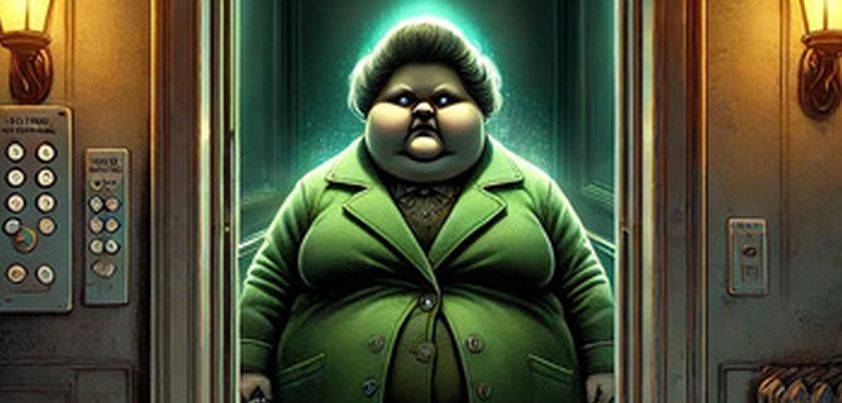 In this story by William Sleator, a timid twelve-year-old who is bullied at school and ridiculed by his father for his weakness faces two fears alone. Always uncomfortable in elevators, his first challenge is the old, creaky three-person elevator in the apartment block they have just moved into. His second fear is a fat woman with a piggish look who stares at him uncomfortably when they meet in the elevator and seems to be stalking him. The latter fear appears justified. Themes include agoraphobia (fear of being trapped), paranoia, facing one’s fears, parental insensitivity.
In this story by William Sleator, a timid twelve-year-old who is bullied at school and ridiculed by his father for his weakness faces two fears alone. Always uncomfortable in elevators, his first challenge is the old, creaky three-person elevator in the apartment block they have just moved into. His second fear is a fat woman with a piggish look who stares at him uncomfortably when they meet in the elevator and seems to be stalking him. The latter fear appears justified. Themes include agoraphobia (fear of being trapped), paranoia, facing one’s fears, parental insensitivity.
The Stars
 This story by S. Rajaratnam is a biting satire of the “science” of astrology. Inspired by the author’s Hindu upbringing in which those around him shared a strong belief that one’s destiny is written in the stars, he relates the tale of an Indian farmer who doubles as his village astrologer. Having charted his own stars and determined the date and time of his death, he decides to silence sceptics by inviting the whole village to witness and celebrate the event. Themes include astrology, determinism vs. free will, obsession, faith, failure (“miscalculation”), scepticism. More…
This story by S. Rajaratnam is a biting satire of the “science” of astrology. Inspired by the author’s Hindu upbringing in which those around him shared a strong belief that one’s destiny is written in the stars, he relates the tale of an Indian farmer who doubles as his village astrologer. Having charted his own stars and determined the date and time of his death, he decides to silence sceptics by inviting the whole village to witness and celebrate the event. Themes include astrology, determinism vs. free will, obsession, faith, failure (“miscalculation”), scepticism. More…
First Confession
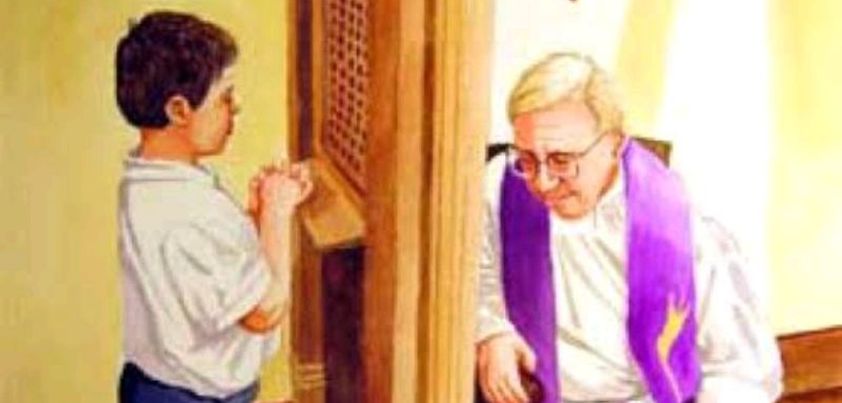 Although the plot of this Frank O’Connor story deals with an important milestone in the Catholic faith, the points made are equally relevant to several other religions. The story satirizes the instilling of fear (of punishment/Hell) as the reason for taking the Eucharist as opposed to celebrating God’s love. A young boy’s intolerance over his country grandmother’s unusual habits results in violent fantasies. A priest’s double standards in scolding the boy’s sister for hitting him and “rewarding” the boy for confessing these murderous thoughts sends them both a confusing message. Themes include innocence, morality, guilt, indoctrination, intimidation, fear, hypocrisy. More…
Although the plot of this Frank O’Connor story deals with an important milestone in the Catholic faith, the points made are equally relevant to several other religions. The story satirizes the instilling of fear (of punishment/Hell) as the reason for taking the Eucharist as opposed to celebrating God’s love. A young boy’s intolerance over his country grandmother’s unusual habits results in violent fantasies. A priest’s double standards in scolding the boy’s sister for hitting him and “rewarding” the boy for confessing these murderous thoughts sends them both a confusing message. Themes include innocence, morality, guilt, indoctrination, intimidation, fear, hypocrisy. More…
Gimpel the Fool
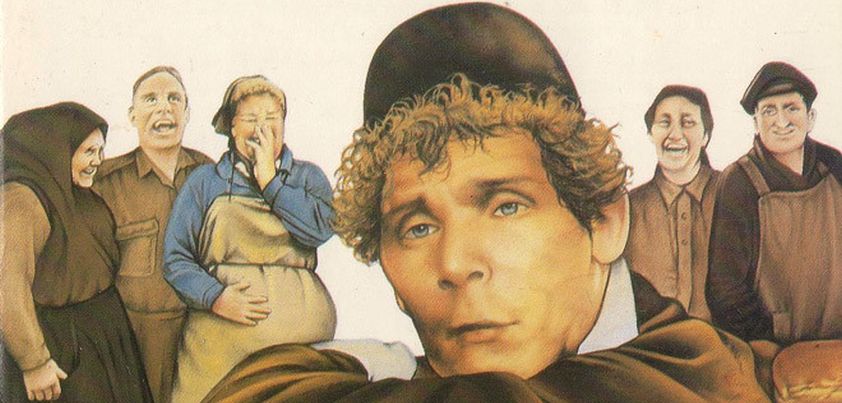 If you take the story at face value (which is often dangerous with a first person narration), Isaac Singer’s Gimpel is no fool. He understands and rationalizes all that has happened in his life, claiming to have been misjudged due to being too trusting and accommodating towards others. Sadly, although not considering himself a fool, he feels compelled to accept the title. The real fools are shown to be those who took advantage of Gimpel, especially his debauched wife who suffers the consequences in the afterlife. Themes: faith, kindness and integrity, forgiveness, strength and wisdom, acceptance. More…
If you take the story at face value (which is often dangerous with a first person narration), Isaac Singer’s Gimpel is no fool. He understands and rationalizes all that has happened in his life, claiming to have been misjudged due to being too trusting and accommodating towards others. Sadly, although not considering himself a fool, he feels compelled to accept the title. The real fools are shown to be those who took advantage of Gimpel, especially his debauched wife who suffers the consequences in the afterlife. Themes: faith, kindness and integrity, forgiveness, strength and wisdom, acceptance. More…
Tiny, Smiling Daddy
 Mary Gaitskill doesn’t pull punches. This is one of those rare stories where you (almost) feel sympathy for a protagonist who is a real jerk. A father reflects on the past after learning that his daughter has written a magazine article about their relationship following her “coming out” as lesbian. Any sympathy stems from the fact that there are two sides to his character: the angry, self-absorbed homophobe who threw his daughter out of the house; and the confused, reclusive, emotionally troubled man struggling to face his failings as a father. Themes: father-daughter relationships, teenage rebellion, sexual identity, acceptance, disconnection. More…
Mary Gaitskill doesn’t pull punches. This is one of those rare stories where you (almost) feel sympathy for a protagonist who is a real jerk. A father reflects on the past after learning that his daughter has written a magazine article about their relationship following her “coming out” as lesbian. Any sympathy stems from the fact that there are two sides to his character: the angry, self-absorbed homophobe who threw his daughter out of the house; and the confused, reclusive, emotionally troubled man struggling to face his failings as a father. Themes: father-daughter relationships, teenage rebellion, sexual identity, acceptance, disconnection. More…
A Rose for Emily
 William Faulkner’s “Emily” is an eccentric woman who had a privileged upbringing in America’s ‘Old South’. There was talk of mental illness in the family, which may explain her difficulty in accepting her father’s death. They were close and, as he had rejected all suitors as not being good enough, she was left alone in the world. When she finally finds love in the unlikely form of a working class Northerner, she takes steps to ensure they remain together for the rest of their lives. Themes: patriarchal control, class, tradition vs. progress, death, isolation and loneliness, pride, gossip, obsessive love. More…
William Faulkner’s “Emily” is an eccentric woman who had a privileged upbringing in America’s ‘Old South’. There was talk of mental illness in the family, which may explain her difficulty in accepting her father’s death. They were close and, as he had rejected all suitors as not being good enough, she was left alone in the world. When she finally finds love in the unlikely form of a working class Northerner, she takes steps to ensure they remain together for the rest of their lives. Themes: patriarchal control, class, tradition vs. progress, death, isolation and loneliness, pride, gossip, obsessive love. More…
Animal Stories
 In this story by Jason Brown, a melancholic young man struggles to deal with his mother’s looming death from a brain tumor. Spanning a brief period from her initial diagnosis in hospital to her refusal of treatment and car ride home, the story is interspersed with memories of the past and diversions involving animal videos playing on the TV in her room. The memories have as much to do with the young man coming to terms with his failures in life as they do with his mother’s deteriorating state of mind. Themes: memories, dysfunctionality, mental instability, devotion, acceptance, nature. More…
In this story by Jason Brown, a melancholic young man struggles to deal with his mother’s looming death from a brain tumor. Spanning a brief period from her initial diagnosis in hospital to her refusal of treatment and car ride home, the story is interspersed with memories of the past and diversions involving animal videos playing on the TV in her room. The memories have as much to do with the young man coming to terms with his failures in life as they do with his mother’s deteriorating state of mind. Themes: memories, dysfunctionality, mental instability, devotion, acceptance, nature. More…
The Beautiful People
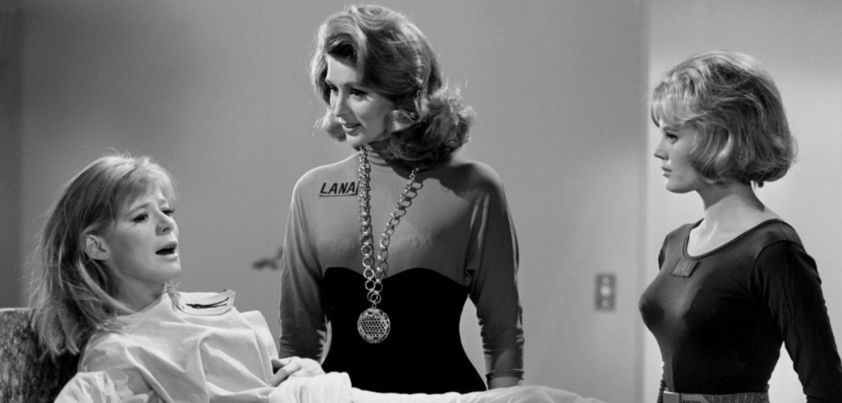 The dystopian civilization envisioned in this Charles Beaumont story has eliminated many of today’s “distractions” such as food preparation, books and even the need for sleep. It has also specified uniform male and female appearances to be adopted by undergoing a “Transformation” (operation) upon turning nineteen. A brave girl resists the change, not only putting her job and family’s social position at risk, but also threatening social stability. As she is frog-marched to the operating theater, she realizes the sinister purpose of Transformation… to remove the population’s sense of individual identity. Themes: identity, body shaming, scientific “advancement”, superficial beauty, conformity. More…
The dystopian civilization envisioned in this Charles Beaumont story has eliminated many of today’s “distractions” such as food preparation, books and even the need for sleep. It has also specified uniform male and female appearances to be adopted by undergoing a “Transformation” (operation) upon turning nineteen. A brave girl resists the change, not only putting her job and family’s social position at risk, but also threatening social stability. As she is frog-marched to the operating theater, she realizes the sinister purpose of Transformation… to remove the population’s sense of individual identity. Themes: identity, body shaming, scientific “advancement”, superficial beauty, conformity. More…
A Useless Man
 Rather than being “useless”, the protagonist of this story by Sait Faik Abasıyanık admits to having given up on life. A recluse, he hasn’t washed himself or left his Istanbul neighborhood of four streets in seven years. He follows the same routine, meets the same people, and fantasizes about the same voluptuous Jewish woman every day. One day, for no apparent reason, he ventures further afield and is dumbstruck by the changes to and vibrancy of the city. After returning home, he is so disoriented by the experience that he contemplates suicide. Themes include alienation, loneliness, fear, hopelessness, depression. More…
Rather than being “useless”, the protagonist of this story by Sait Faik Abasıyanık admits to having given up on life. A recluse, he hasn’t washed himself or left his Istanbul neighborhood of four streets in seven years. He follows the same routine, meets the same people, and fantasizes about the same voluptuous Jewish woman every day. One day, for no apparent reason, he ventures further afield and is dumbstruck by the changes to and vibrancy of the city. After returning home, he is so disoriented by the experience that he contemplates suicide. Themes include alienation, loneliness, fear, hopelessness, depression. More…
Emergency
 Our objective is to include stories from as wide a range of well-known authors as possible. Occasionally this entails featuring a story that some may find frivolous or offensive, but others rave about. So it is with this humorous drugs-fiction tale from Denis Johnson. Two friends, a hospital clerk and orderly, stumble through their shift (and manage to save an emergency patient’s eyesight!) while high on stolen medication. They then embark on a drug-addled drive involving a carnival, famous guru, dead rabbits, mistaken military graveyard, and AWOL soldier. Themes: death, despair, escapism, drug abuse, responsibility, and illusion vs. reality. More…
Our objective is to include stories from as wide a range of well-known authors as possible. Occasionally this entails featuring a story that some may find frivolous or offensive, but others rave about. So it is with this humorous drugs-fiction tale from Denis Johnson. Two friends, a hospital clerk and orderly, stumble through their shift (and manage to save an emergency patient’s eyesight!) while high on stolen medication. They then embark on a drug-addled drive involving a carnival, famous guru, dead rabbits, mistaken military graveyard, and AWOL soldier. Themes: death, despair, escapism, drug abuse, responsibility, and illusion vs. reality. More…
Why I Live at the P.O.
 The major themes in Eudora Welty’s comical account of a family squabble are jealousy and sibling rivalry. When a prodigal daughter returns with a two-year-old child in tow the petulant narrator, who has remained at home, is far from welcoming. The story is a dramatic monologue told five days after the events. We only see one very biased side of what happened and, as the narrator is trying to justify her move to the “P.O.”, it is almost impossible to form an opinion as to the accuracy of her account. Other themes: family, isolation, denial, acceptance, pride, independence. More…
The major themes in Eudora Welty’s comical account of a family squabble are jealousy and sibling rivalry. When a prodigal daughter returns with a two-year-old child in tow the petulant narrator, who has remained at home, is far from welcoming. The story is a dramatic monologue told five days after the events. We only see one very biased side of what happened and, as the narrator is trying to justify her move to the “P.O.”, it is almost impossible to form an opinion as to the accuracy of her account. Other themes: family, isolation, denial, acceptance, pride, independence. More…
Blacksoil Country
 Blacksoil Country by David Malouf has major themes of struggle taming the Australian bush, tolerance of its native peoples, and perspectives on ownership and access to the land. A settler shoots an innocent Aborigine bearing a gift from a neighbor. Shortly afterwards, his twelve-year-old son is brutally murdered. This triggers a racially driven killing spree, which elevates the man from a surly loner nobody wanted to associate with to hero status. Ironically, the boy is the only “white” character to have come close to understanding Aboriginal spiritual connections to the land. Other themes: father-son relationships, loyalty, racism, violence, revenge, spirituality. More…
Blacksoil Country by David Malouf has major themes of struggle taming the Australian bush, tolerance of its native peoples, and perspectives on ownership and access to the land. A settler shoots an innocent Aborigine bearing a gift from a neighbor. Shortly afterwards, his twelve-year-old son is brutally murdered. This triggers a racially driven killing spree, which elevates the man from a surly loner nobody wanted to associate with to hero status. Ironically, the boy is the only “white” character to have come close to understanding Aboriginal spiritual connections to the land. Other themes: father-son relationships, loyalty, racism, violence, revenge, spirituality. More…
Exchange Value
 This story by Charles Johnson explores the theme that wealth brings power. Two brothers break into the apartment of an elderly, reclusive neighbor. The woman, who has been living in squalor, lies dead in bed. In her living room are cash and other valuables worth over a million dollars, which they quickly move to their own apartment. The younger brother looks forward to the better life money will bring. However, he is overruled by his older brother, who suffers the same strange reluctance to spend any of it as the old woman had. Other themes include hoarding, paranoia, isolation, poverty. More…
This story by Charles Johnson explores the theme that wealth brings power. Two brothers break into the apartment of an elderly, reclusive neighbor. The woman, who has been living in squalor, lies dead in bed. In her living room are cash and other valuables worth over a million dollars, which they quickly move to their own apartment. The younger brother looks forward to the better life money will bring. However, he is overruled by his older brother, who suffers the same strange reluctance to spend any of it as the old woman had. Other themes include hoarding, paranoia, isolation, poverty. More…
Armistice
 The major themes of this story from Bernard Malamud are violence, ethnic cleansing, war, racism, and compromised morals. Increasing tension between Jewish grocer Morris and German small-goods provider Gus mirrors unfolding events in Eastern Europe in the lead up to France’s surrender in World War Two. Morris, who witnessed the violent Russian pogroms against his people, is concerned the same will happen in France. Fascist-leaning Gus believes the invasion is justified because of France’s poor treatment of Germany following World War One. However, neither party feels strongly enough to terminate their business relationship for fear of losing money. More…
The major themes of this story from Bernard Malamud are violence, ethnic cleansing, war, racism, and compromised morals. Increasing tension between Jewish grocer Morris and German small-goods provider Gus mirrors unfolding events in Eastern Europe in the lead up to France’s surrender in World War Two. Morris, who witnessed the violent Russian pogroms against his people, is concerned the same will happen in France. Fascist-leaning Gus believes the invasion is justified because of France’s poor treatment of Germany following World War One. However, neither party feels strongly enough to terminate their business relationship for fear of losing money. More…
Zita
 There are two Zitas in this romantic coming of age story by Arturo B Rotor. The first is the woman who caused a broken-hearted young man to seek solace teaching on Anayat, an off-the-grid Philippine island of broken cliffs and coconut palms; the second, an adolescent Anayat schoolgirl who he agrees to teach how “to be a lady”. As sometimes happens, schoolgirl Zita develops a crush on the teacher. When he leaves in the hope of reconciling with his former love, she comes to understand something he once told her. Themes: unrequited love, alienation, depression, teenage infatuation. More…
There are two Zitas in this romantic coming of age story by Arturo B Rotor. The first is the woman who caused a broken-hearted young man to seek solace teaching on Anayat, an off-the-grid Philippine island of broken cliffs and coconut palms; the second, an adolescent Anayat schoolgirl who he agrees to teach how “to be a lady”. As sometimes happens, schoolgirl Zita develops a crush on the teacher. When he leaves in the hope of reconciling with his former love, she comes to understand something he once told her. Themes: unrequited love, alienation, depression, teenage infatuation. More…
The 400-Pound CEO
 In George Saunders’s typical over-the-top style, this story uses dark humor to address themes of bullying and body shaming. Despite the indignation of being stuck in an unrewarding, distasteful job and suffering constant humiliation from colleagues, the 400-pound narrator remains calm and optimistic about the future. Things change when “a lifetime of scorn” boils over and he commits murder. In prison, his hope is replaced by misery. Although most of the story has a satirical tone, it ends on a philosophical note, questioning the existence and fairness of God. Other themes: isolation, sadism, animal cruelty, atheism More…
In George Saunders’s typical over-the-top style, this story uses dark humor to address themes of bullying and body shaming. Despite the indignation of being stuck in an unrewarding, distasteful job and suffering constant humiliation from colleagues, the 400-pound narrator remains calm and optimistic about the future. Things change when “a lifetime of scorn” boils over and he commits murder. In prison, his hope is replaced by misery. Although most of the story has a satirical tone, it ends on a philosophical note, questioning the existence and fairness of God. Other themes: isolation, sadism, animal cruelty, atheism More…
Her Mother
 This story by Anjana Appachana describes an Indian mother’s feelings of anguish, grief and betrayal upon reading the perfunctory first letter home from her younger daughter who has travelled to America to complete a Ph.D. Much of the story involves her thoughts on how best to reply. These range from ranting about personal care and the dangers of American life, providing “chatty” family news and encouraging her to find and marry a suitable Indian man, and confronting her about her abrupt decision to leave in such anger. Themes include tradition vs. westernization, independence, marriage and gender roles, double standards, self-pity. More…
This story by Anjana Appachana describes an Indian mother’s feelings of anguish, grief and betrayal upon reading the perfunctory first letter home from her younger daughter who has travelled to America to complete a Ph.D. Much of the story involves her thoughts on how best to reply. These range from ranting about personal care and the dangers of American life, providing “chatty” family news and encouraging her to find and marry a suitable Indian man, and confronting her about her abrupt decision to leave in such anger. Themes include tradition vs. westernization, independence, marriage and gender roles, double standards, self-pity. More…
Beggar My Neighbor
 In this story by Dan Jacobson, a white South African boy is confronted by the cruel realities of racism when a charitable decision to give food to two black street children gets out of hand. As the children approach him with increasing frequency, his attitude towards them changes from pity and condescension to contempt and hatred. In an epiphany that comes in a dream, he realizes that they hate him just as much as he does them, and simply want to be treated with dignity. Themes include poverty, compassion, vanity, fantasy, social class, racism, humanity. More…
In this story by Dan Jacobson, a white South African boy is confronted by the cruel realities of racism when a charitable decision to give food to two black street children gets out of hand. As the children approach him with increasing frequency, his attitude towards them changes from pity and condescension to contempt and hatred. In an epiphany that comes in a dream, he realizes that they hate him just as much as he does them, and simply want to be treated with dignity. Themes include poverty, compassion, vanity, fantasy, social class, racism, humanity. More…
Birthmates
 Life for Gish Gen’s Chinese-American protagonist is not looking good. A salesman in a dying industry, he has recently divorced due to different “perspectives” on racism at work and his inability to grieve over his wife’s two miscarriages and a medical termination. Upon arrival at a sales convention, he finds that he has booked into a welfare hotel where playful children assault him the following morning. The kindness of one of its residents and a lost job opportunity cause him to finally face the loss of his wife and “child”. Themes: paranoia, self-esteem, alienation, loss, grief, cultural differences, racism, desperation. More…
Life for Gish Gen’s Chinese-American protagonist is not looking good. A salesman in a dying industry, he has recently divorced due to different “perspectives” on racism at work and his inability to grieve over his wife’s two miscarriages and a medical termination. Upon arrival at a sales convention, he finds that he has booked into a welfare hotel where playful children assault him the following morning. The kindness of one of its residents and a lost job opportunity cause him to finally face the loss of his wife and “child”. Themes: paranoia, self-esteem, alienation, loss, grief, cultural differences, racism, desperation. More…